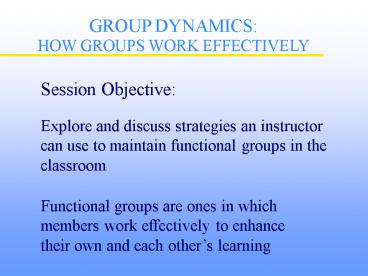GROUP DYNAMICS: PowerPoint PPT Presentation
1 / 18
Title: GROUP DYNAMICS:
1
GROUP DYNAMICS HOW GROUPS WORK EFFECTIVELY
Session Objective
Explore and discuss strategies an instructor can
use to maintain functional groups in the classroom
Functional groups are ones in which members work
effectively to enhance their own and each others
learning
2
WHY USE GROUPS?
- Modest gains in test scores
- Better retention
- More positive attitude towards the subject
- Builds social and interpersonal skills
Johnson, Johnson and Smith. ERIC ASHE Higher
Education Report No. 4
3
FORMING GROUPS
Example
- Sum the digits in your SS 38
- Sum the digits in your date of birth 62
- If you have used groups in your class
- add 25 25
- If you have attended a previous workshop on
- groups add 50 -
- If you have no prior experience with groups
- groups, add 100 -
- If you are female, add 100 -
- If you are male, add 200 200
Grand Total (Your Number) 325
(Modified from procedure used by Dr. Steven
Richardson, Iowa State University)
4
The Top Five Ways to Wreck a Group
List 5 behaviors or actions that can undermine
good group function Report out in 7 minutes
5
The 5 Basic Elements of Group Learning
- Positive interdependence
- Individual accountability
- Promotive interaction (face-to-face)
- Use of teamwork skills
- Group processing
Johnson, Johnson Smith. Maximizing Instruction
Through Cooperative Learning. AAHE Prism. Feb.
1998.
6
SUGGESTIONS FOR USING GROUPS
- Set the stage early
7
GETTING STARTED
- Explain why you think active learning/using
groups is a good strategy - Ask students to report on past experiences
- Talk about the support mechanisms youll have
- Group warm-up activities
8
SUGGESTIONS FOR USING GROUPS
- Set the stage early
- Heterogeneously selected
9
FORMING GROUPS
- Randomly heterogeneous -
- counting off
- from roster
- in class
- Intentionally heterogeneous, based
- on information
- from student records
- supplied by students
10
STUDENT PROFILE FORM
- What is your name, phone , e-mail address, sex,
major? - What is your desired grade for the course?
- Do you consider yourself to be an active
participant in group discussions? - Are you willing to serve as a group leader?
- Is there any information the instructor should
consider in assigning you to a heterogeneous
group?
Developed by Araya Debessay
11
SUGGESTIONS FOR USING GROUPS
- Set the stage early
- Heterogeneously selected
- Use permanent groups of about 4-6
- Rotating roles of responsibility
12
ROTATING ROLES
- Discussion Leader
- Keeps group on track maintains full participation
- Recorder
- Records assignments, strategies, unresolved
issues, - data convenes group outside of class
- Reporter
- Reports out during whole class discussion writes
- up final draft of assignments
- Accuracy Coach
- Checks group understanding finds resources
13
SUGGESTIONS FOR USING GROUPS
- Set the stage early
- Heterogeneously selected
- Use permanent groups of about 4-6
- Rotating roles of responsibility
- Group-selected ground rules
14
Examples of Ground Rules
Come to class on time every day Come to class
having done the assignment and prepared to
discuss it Must notify members of the group ahead
of time if must miss class for any reason Be
willing to share information Respect the views,
values, and ideas of other members of the group
If members of the group violate these ground
rules, other members of the group may impose
the following consequences
15
SUGGESTIONS FOR USING GROUPS
- Set the stage early
- Heterogeneously selected
- Use permanent groups of about 4-6
- Rotating roles of responsibility
- Group-selected ground rules
- Peer evaluation
16
PEER EVALUATION
Some basic considerations
- Use predetermined written criteria that focus
primarily on behaviors - Do at least 2X per semester
- Factor results into students grades
- Summarize results and distribute summaries
- Keep the process simple
- Incorporate into group assignments
17
USING GROUPS IN LARGER CLASSES
Strategies that can work
- Well-defined activities
- Bring the class together for discussion and/or
clarification at about15 min. intervals - Group products
- Look for signs of behaviors that undermine group
function - Use undergraduate (peer) group facilitators
18
Observations and Analysis Have Revealed That
Learning is identified by students as getting the
right answer. Learning is dissociated from
understanding and explaining. Answers are sought
first by recall, not analysis. Considerable time
is needed before concepts are considered and even
rudimentary analysis is attempted
From D. Hanson and T. Wolfskill, J. Chem. Ed.
75(2) 143-147, 1998.

